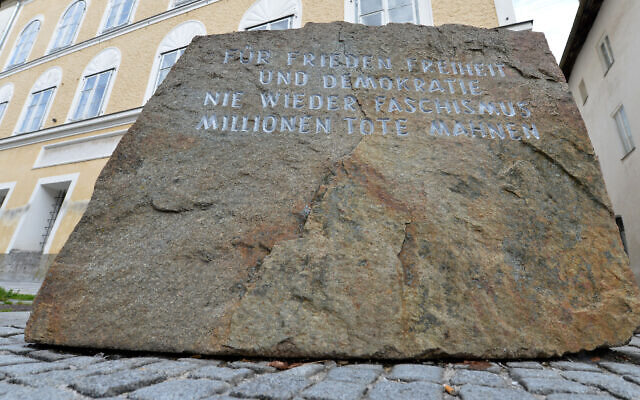Hitler’s birth site to become human rights training center for Austrian police
Interior Ministry says facility will be part of plan to open police station at Braunau am Inn estate, aiming to counter its ‘mythical appeal to extremist circles’

The house where Nazi Germany’s leader Adolf Hitler was born will be turned into a human rights training center for police officers, Austria’s Interior Ministry said Wednesday.
The facility will be incorporated into the 17th-century building in the northwestern town of Braunau am Inn. Austria already said in 2019 that the site would be used as a police station.
The Interior Ministry said the decision to add the training facility was taken at the recommendation of an interdisciplinary expert commission focused on countering the site’s “mythical appeal to extremist circles,” CNN reported.
“It will be an office for the largest human rights organization in Austria – the police – and it will also be a center for training in this fundamentally important topic,” said commission member Hermann Feiner in a statement.
Converting the 800-square-meter (8,600-square-foot) property — which also has several garages and parking spaces located behind the main building — will cost an estimated 20 million euros ($21.5 million) and is expected to be completed in 2025. Police will enter the building the following year.
The local town council decided that a memorial stone in front of the building, engraved with “For peace, freedom and democracy – never again fascism – remembering the deaths of millions,” will remain in place, The Guardian reported. Initial plans called for it to be removed and placed in a museum.

The yellow corner house in the northern Austrian town of Braunau on the border with Germany, where Hitler was born on April 20, 1889, was taken into government control in 2016. Hitler’s family moved out when he was three years old.
Although Hitler only spent a short time at the property, it has continued to draw Nazi sympathizers from around the world.
Anti-fascist protesters have also organized rallies outside the building on Hitler’s birthday.
The building’s fate was the subject of a lengthy legal battle with the house’s owner, which only ended in 2019.
Austria’s highest court ruled then that Gerlinde Pommer, whose family owned the house for nearly a century, was entitled to some 810,000 euros ($906,000) in compensation, ending a lengthy legal battle.
Pommer had been renting the property to the Interior Ministry since the 1970s.
The government paid her around 4,800 euros ($5,200) a month and used it as a center for people with disabilities.
But this arrangement fell apart in 2011 when Pommer refused to carry out essential renovation work and also declined to sell it.
Since then, the building has lain empty.
At one point, the ministry was pushing to have it torn down, but the plans ran into angry resistance from politicians and historians.
Germany annexed Austria in 1938, and although many top henchmen from Hitler downwards were Austrians, historians say the small Alpine country was for many years slow to acknowledge its shared responsibility for the Holocaust and the other crimes of the Nazis.










